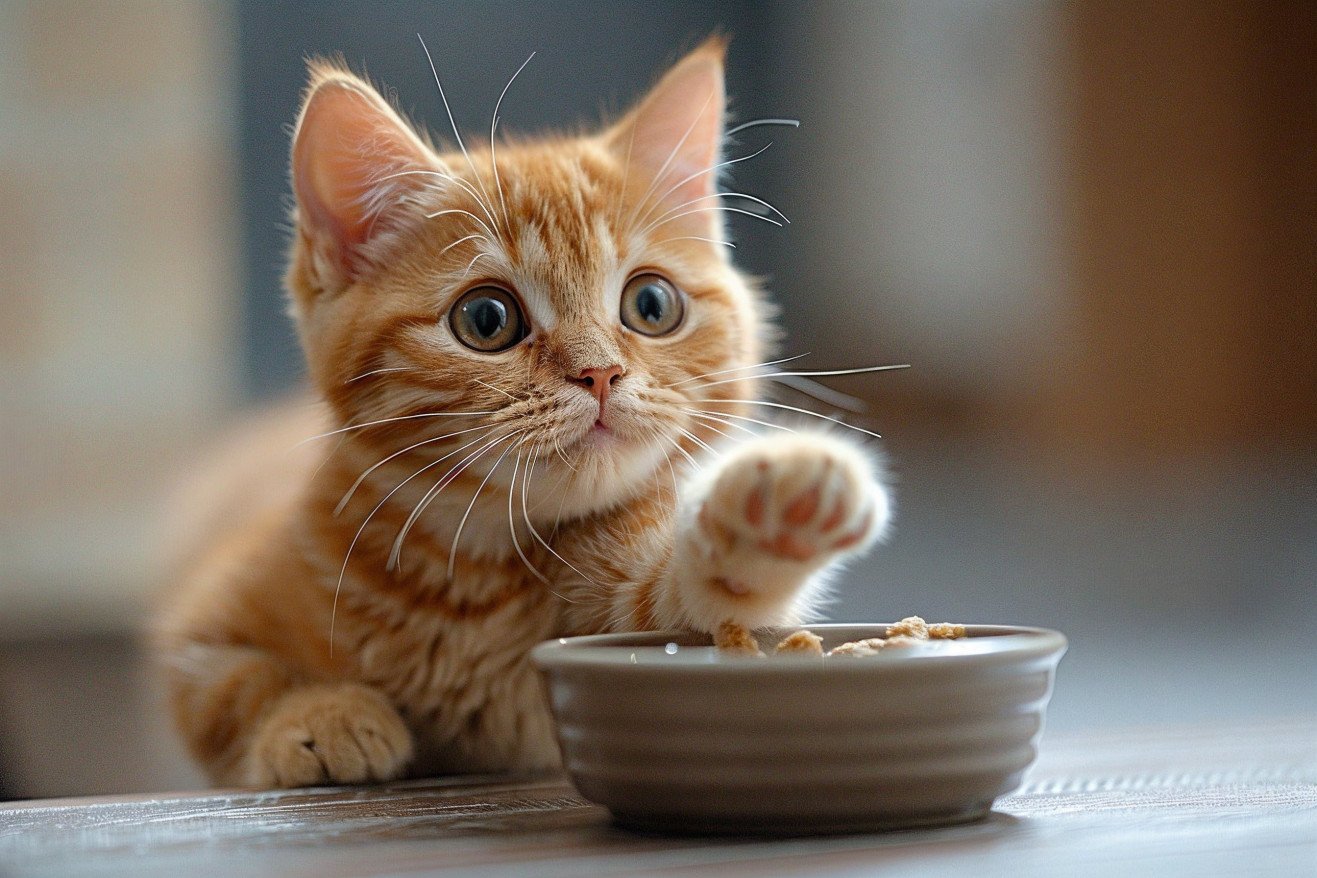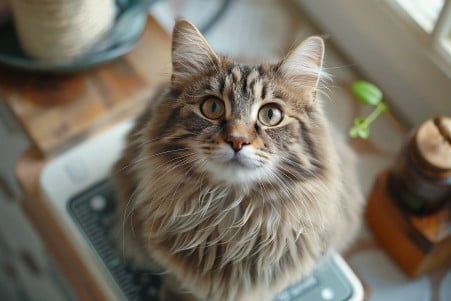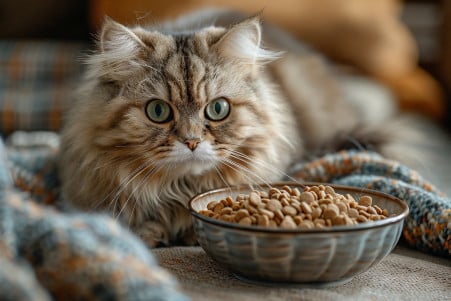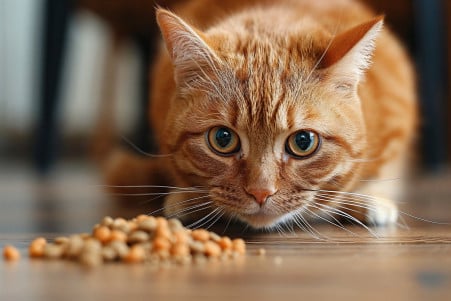Why Is My Cat Always Hungry? Exploring Feline Dietary Needs
14 May 2024 • Updated 13 May 2024

Cats may sometimes appear to be eating all the time, but there are a number of reasons for their constant hunger, including their natural instincts, medical issues, and other factors. Cats are natural hunters and, as a result, are biologically programmed to eat several small meals a day and night. However, constant hunger can also be a sign of a medical issue, such as diabetes, thyroid disease, or worms, all of which can cause an increase in appetite. In addition, cats may be asking for more food because they're bored, anxious, or just like the tasty treats you give them.
In this article, we'll explore the reasons for your cat's constant hunger, drawing on the latest research from veterinary professionals about feline dietary needs, nutritional imbalances, and medical conditions that may be causing your cat to eat more than usual. We'll also look at studies on cat behavior and nutritional information about popular cat foods to help you understand how to meet your cat's needs while also helping them stay at a healthy weight. Our investigation will also offer actionable advice on how to adjust feeding times, identify symptoms of medical conditions, and create an engaging environment that will help prevent food-seeking behavior.
Why is my cat always hungry?
Cat Nutrition: The Importance of Portion Control and a Balanced Diet
Cats have different nutritional requirements based on a variety of factors including age, weight, activity level, and health status. It is important to know how many calories your cat should be eating each day and to portion out their food accordingly to avoid overeating and obesity. As veterinarian Dr. Callie Harris explains, "If your cat is not at her ideal body condition, you may need to adjust what and how much you feed her."
Dry and wet cat foods have different calorie densities, so it is important to follow the feeding guidelines on the package or talk to your vet. A calorie calculator from Preventive Vet can also be used to estimate a cat's caloric needs. For example, the average 10 lb neutered adult male cat needs about 200 calories a day.
Feeding a balanced diet that is rich in nutrients, including high-quality protein, fats, and other essential nutrients, can help control hunger and prevent overeating. According to The Honest Kitchen, most cats should eat between 20-33 calories per pound based on their activity level. In general, it is best to feed cats meals at set times rather than allowing them to free-feed to prevent overeating.
By learning about their cat's specific caloric requirements and making sure they are eating a balanced diet that is fed to them in meals, not free-fed, cat owners can make sure their pets are satisfied and not overweight. This will help ensure that they are in a good position to explore medical causes of increased hunger.
Medical Reasons for a Cat's Constant Hunger
There are several medical issues that can cause a cat to be constantly hungry, including hyperthyroidism, diabetes, inflammatory bowel disease, and parasitic infections. PetMD notes that hyperthyroidism, which is common in older cats, can lead to increased appetite, as well as weight loss and increased thirst and urination.
Diabetes mellitus, which is a disorder of glucose regulation, can also cause increased hunger and weight loss despite eating more food. The PDSA also points out that intestinal parasites, such as roundworms or tapeworms, can lead to a cat feeling hungry all the time and other gastrointestinal issues. It's important to determine and treat the medical issue that's causing a cat's constant hunger in order to help them and to prevent other health problems.
Once medical reasons for constant hunger have been ruled out, it's time to look at environmental and behavioral reasons that could be contributing to a cat's constant hunger.
Environmental Factors and Behavioral Causes of Overeating
Cats that are bored, stressed, or not mentally stimulated may be more likely to overeat and exhibit food-seeking behavior. PetMD notes that an enriched environment that includes toys, puzzle feeders, and regular playtime can help reduce overeating due to boredom. In addition, certain medications and changes in a cat's daily routine can cause an increase in appetite and weight gain.
The PDSA lists that managing any stress or anxiety that may be caused by environmental changes, like making changes slowly and providing hiding places, can help manage overeating due to stress. Furthermore, genetics and individual preferences may also contribute to a cat's tendency to overeat or become obsessed with food.
Knowing the environmental and behavioral causes that can lead to a cat's increased appetite can help cat owners prevent overeating and encourage healthy eating habits.
How to Prevent and Treat Feline Overeating
Puzzle feeders, slow-feed bowls, and adding non-edible barriers to food bowls can help slow down cats that eat too quickly and prevent overeating, according to Catster. Automatic feeders that dole out small meals at regular intervals can also help control portion sizes and more closely mimic a cat's natural feeding behavior, according to PetMD.
Regular exercise and play can help increase a cat's energy expenditure and prevent them from taking in too many calories, says Furratic Behavior. In addition, treats should make up no more than 10% of a cat's daily caloric intake to prevent overeating and weight gain, according to Catster.
Switching to a lower-calorie, high-protein wet food diet can also help cats feel more satisfied on fewer calories, according to Trupanion. By using these methods, cat parents can help prevent and treat feline overeating and support their cats' healthy weight and overall health.
How to Tell If Your Cat Is Overweight
Obesity is a common problem in pet cats, with as many as 50% of cats being overweight or obese, according to Madison Animal Care Hospital. Signs of obesity in cats include not being able to feel their ribs and spine, and a belly that hangs down or jiggles. Overweight cats are more likely to develop health problems like diabetes, arthritis, liver disease, and heart disease, according to Greencross Vets.
Consistently overfeeding your cat can cause digestive issues, malabsorption of nutrients, and changes in a cat's gut microbiome, according to Popular Science. Treatment for obesity in cats typically involves gradually reducing the amount of food you feed your cat, increasing their exercise, and possibly switching to a weight-management diet with the help of a veterinarian, according to PetMD and Lovenala.
If you can recognize the signs of obesity in your cat and take steps to manage the condition, you can prevent your cat from suffering the serious health problems associated with obesity and help them stay healthy and active.
Conclusion: How to Deal With Cat Hunger and Encourage Healthy Eating
It is important to know what cats eat in the wild and to be aware of the medical and environmental factors that can lead to increased hunger. Feeding cats at regular times, in appropriate amounts, and with a nutritionally complete diet can help manage hunger and prevent overeating.
In addition to feeding, environmental enrichment, regular exercise, and medical care can help control hunger. Regularly monitoring and feeding cats to maintain a healthy weight can help prevent health problems associated with obesity. If cats are eating too much, losing weight, or showing other signs of poor health, it is important to see a vet.


